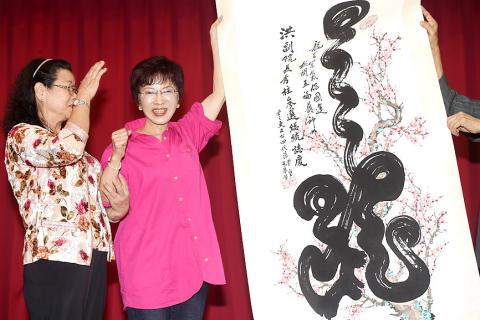Chinese Nationalist Party (KMT) presidential candidate Hung Hsiu-chu (洪秀柱) yesterday likened the struggle of her campaign to gain momentum to Republic of China (ROC) founding father Sun Yat-sen’s (孫逸仙) initial failures to overthrow the Qing Dynasty.
According to a poll conducted by Taiwan Indicators Survey Research (TISR) and released on Friday, Hung’s support has dropped to 12.7 percent, a decline from the 15 percent backing she received in a poll released by the Cross-strait Policy Association on Wednesday.
Of those surveyed, 37.3 percent in the Taiwan Indicators poll said they would vote for Democratic Progressive Party presidential candidate Tsai Ing-wen (蔡英文), while People First Party (PFP) presidential candidate James Soong (宋楚瑜) garnered 19.1 percent.

Photo: Liao Chen-huei, Taipei Times
Asked about rumors that some within the KMT’s own ranks oppose her candidacy and have asked her to withdraw if her numbers do not improve — with KMT Taipei City Councilor Lee Hsin (李新) proposing a head-to-head vote be conducted between Hung and Soong — Hung cited Sun as an example to demonstrate her resolve.
“Do you know how many times Sun launched insurrections against the Qing Dynasty before he finally succeeded? How could the ROC have been established if he had given up after just a single failure?” she said.
When asked about the possibility of a team-up between the KMT and the PFP, Hung said on Friday night it is “not possible” and reiterated yesterday that she is the candidate endorsed by the KMT’s national congress.
Hung also explained what she meant when she said in an interview on Friday night that she would like “more attention from [Legislative Speaker] Wang Jin-pyng (王金平) and [Vice President] Wu Den-yih (吳敦義),” denying she was suggesting the two are reluctant to help.
“It is just a call for party solidarity. People have the feeling that that the campaign is picking up momentum, but we just hope that the effort can speed up more,” she said.

‘FORM OF PROTEST’: The German Institute Taipei said it was ‘shocked’ to see Nazi symbolism used in connection with political aims as it condemned the incident Sung Chien-liang (宋建樑), who led efforts to recall Democratic Progressive Party (DPP) Legislator Lee Kun-cheng (李坤城), was released on bail of NT$80,000 yesterday amid an outcry over a Nazi armband he wore to questioning the night before. Sung arrived at the New Taipei City District Prosecutors’ Office for questioning in a recall petition forgery case on Tuesday night wearing a red armband bearing a swastika, carrying a copy of Adolf Hitler’s Mein Kampf and giving a Nazi salute. Sung left the building at 1:15am without the armband and apparently covering the book with a coat. This is a serious international scandal and Chinese

PERSONAL DATA: The implicated KMT members allegedly compiled their petitions by copying names from party lists without the consent of the people concerned Judicial authorities searched six locations yesterday and questioned six people, including one elderly Chinese Nationalist Party (KMT) member and five KMT Youth League associates, about alleged signature forgery and fraud relating to their recall efforts against two Democratic Progressive Party (DPP) legislators. After launching a probe into alleged signature forgery and related fraud in the KMT’s recall effort, prosecutors received a number of complaints, including about one petition that had 1,748 signatures of voters whose family members said they had already passed away, and also voters who said they did not approve the use of their name, Taipei Deputy Chief Prosecutor

UNDER ATTACK: Raymond Greene said there were 412 billion malicious threats in the Asia-Pacific region in the first half of 2023, with 55 percent targeting Taiwan Taiwan not only faces military intimidation from China, but is also on the front line of global cybersecurity threats, and it is taking action to counter those attacks, President William Lai (賴清德) said yesterday. Speaking at the opening of this year’s Cybersec Expo in Taipei, the president assured foreign diplomats and exhibitors that Taiwan remained committed to strengthening its defense against cyberattacks and enhancing the resilience of its digital infrastructure. Lai referenced a report from the National Security Bureau (NSB) indicating that the Government Service Network faced an average of 2.4 million intrusion attempts daily last year, more than double the figure

COUNTERINTELLIGENCE TRAINING: The ministry said 87.5 percent of the apprehended Chinese agents were reported by service members they tried to lure into becoming spies Taiwanese organized crime, illegal money lenders, temples and civic groups are complicit in Beijing’s infiltration of the armed forces, the Ministry of National Defense (MND) said in a report yesterday. Retired service members who had been turned to Beijing’s cause mainly relied on those channels to infiltrate the Taiwanese military, according to the report to be submitted to lawmakers ahead of tomorrow’s hearing on Chinese espionage in the military. Chinese intelligence typically used blackmail, Internet-based communications, bribery or debts to loan sharks to leverage active service personnel to do its bidding, it said. China’s main goals are to collect intelligence, and develop a